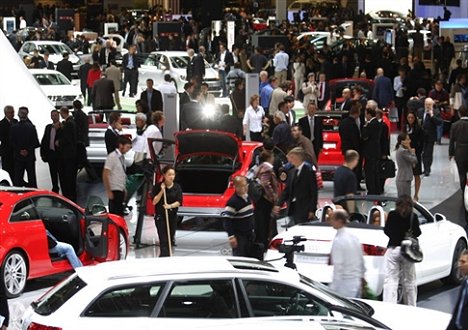
Morgan Naidu reflects on some of 2008’s lowlights of the motoring industry – local and abroad.
When the head of the British royal family, Queen Elizabeth, stood up to deliver her keynote address in 1992 to celebrate her then 40 years at the helm she chanced upon the Latin phrase annus horribilis to capture succinctly the rather crappy year she had just endured.
A fire at one of her castles had followed announcements of divorces of key royals, with the big one, the separation of Diana Charles still a forthcoming attraction.
For the global and South African car industry, the year 2008 certainly resonates as an annus horribilis on a number of fronts, with a few fires, some implosions and a divorce or two on the horizon.
The global financial crisis has put the auto industry royals of General Motors, Ford and Chrysler firmly in the spotlight, exposing their rather tenuous operations which are in desperate need of billions of dollars in bailout money.
It's hard not to escape the irony that bailouts are usually reserved for those arrested and accused of nefarious behaviour and, in the context of Detroit’s leading car makers, the accusations are aplenty and run back for many years.
Big Three versus Europe, Japan
Union troubles, the costs of soaring medical aid and pension funds together with the leaner, meaner operations of their European and Asian rivals have all conspired to put the Detroit royals on the precipice as they have been for most of 2008.
The spectre of a GM bankruptcy alone would mean millions of jobs lost, hence the calls for President-elect Barack Obama to appoint a car czar to help turn around the auto industry in the USA.
Meanwhile, in March this year it was not so much a divorce as it was a polygamist husband turfing out two of his underperforming wives when the more than two-billion American dollar buyout of Jaguar and Land Rover was completed by Indian industrialist Tata.
In South Africa, the conclusion of the deal would mean the beginning of a transition phase involving complex system changes, hiring of new staff and a reorganisation of the local operating structures of the brands.
Of course, the obligatory utterances about it being a new partnership and not just new ownership were bandied about while Jag bosses insisted that keeping production of the luxury marque in the United Kingdom was not even an issue for debate.
Freaky as it may sound, the motoring world was in a different space those months ago and I suspect that the old guard of Jaguar and Land Rover may have underestimated the ability of the Indians to remain patient for the next five years before they roll out the ruthless and talk new productions plants.
Wakey, wakey!
The state of South Africa’s monthly car sales figures would not have been so shocking in 2008 had it not taken the car companies and local dealers by such surprise.
Seduced by fantastical figures of recent years and the promise of the 2010 World Cup, finance institutions, car companies and dealers were jointly arrogant in their belief that the strong market sentiment would hold, even admitting to being “aggressive” in their pursuit of new business deals in the run-up to the National Credit Act last year.
Interest rate hikes, fuel price hikes, inflation and increasing consumer debt took its collective toll as car companies and dealers scratched their heads this year, pondering how to get rid of new stock and pay the interest on the new multi-million rand dealerships.
But, if 2008 was the annus horribilis for car companies, it was tenfold worse for hapless buyers of a brand of car known as Seat, owned and imported by Volkswagen SA.
From day one, Volkswagen screwed up the Seat brand locally by trying to price it as a premium product.
Then there was the slashing of prices with a cash-back offer to those who had purchased at pre-reduction prices.
This year’s announcement by VW South Africa that it would cease to offer the SEAT brand in SA came with little warning to the consumer, fuelling the dissatisfaction that customers felt and leaving Seat car owners with precious little warm and fuzzy feelings towards parent company VW.
After the announcement, there were anecdotes aplenty as Seat buyers found little support from dealers and even less support from VW South Africa.
It was a classic case of how not to do business, win friends and influence car buyers.
Better luck in 2009?
With 2008 all but a bad nightmare for some, the prospect of 2009 looms large for a motoring industry in desperate need of good news and a short, sharp kick up the backside.
With promises of fuel price drops and a few interest rate cuts over the next year or two, the car industry has a chance to regroup and convince the buying public once more.
In South Africa and across the world, it's been the larger, more established brands and car companies that have floundered the most this past year, shifting the spotlight away from the likes of cheap Chinese importers who should be getting the attention and scrutiny.
With the annus horribilis almost behind them, car companies will need every bit of holiday cheer they can muster.
Disclaimer: Wheels24 encourages freedom of speech and the expression of diverse views. The views of columnists published on Wheels24 are therefore their own and do not necessarily represent the views of Wheels24.




 Publications
Publications
 Partners
Partners









